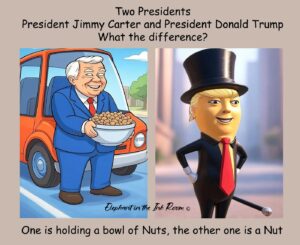President Jimmy Carter
On
- Real Men

/
RSS Feed
President Jimmy Carter: The Power of Selfless Service
Jimmy Carter’s presidency (1977–1981) was marked by economic challenges and foreign policy crises, leading some to label him a “weak president.” But history tells a different story. It was after he left office that Carter’s greatness truly emerged.
This wasn’t a man chasing power, attention, or wealth. Carter devoted the rest of his life — more than four decades — to humanitarian causes, global diplomacy, and public service. He turned the quiet years after the presidency into a platform for peace, justice, and dignity.
Before the Presidency: A Foundation in Service
-
Naval Officer & Engineer: Carter graduated from the U.S. Naval Academy in 1946, serving on submarines and working under Admiral Hyman Rickover on the early nuclear fleet. He developed a reputation for discipline, intelligence, and humility.
-
Peanut Farmer: After his father’s death, Carter returned to Plains, Georgia, where he modernized and saved the family’s struggling peanut business. He understood labor, economics, and resilience from the ground up.

-
Progressive Southern Governor: As Georgia’s governor (1971–1975), Carter pushed for government reform, racial integration, better mental health systems, and environmental conservation — rare and risky stands in the South at the time.
After the Presidency: Service Over Self
The Carter Center (Founded 1982)
Created with Rosalynn Carter to promote peace, fight disease, and strengthen human rights globally.
-
Disease Eradication: The Carter Center led efforts that reduced Guinea worm disease from 3.5 million cases in 1986 to fewer than 10 in 2023. Carter once said:
“I’d like the last guinea worm to die before I do.”
The Center also fought river blindness, malaria, and other neglected diseases.
-
Election Monitoring: Carter personally observed over 100 elections in 39 countries — from Nicaragua to Ghana — helping ensure democratic integrity where it was fragile or new.
-
Conflict Mediation: Often working behind the scenes, Carter brokered peace talks or humanitarian access in North Korea (1994), Sudan, Ethiopia, Haiti, Bosnia, and beyond.
Habitat for Humanity
Starting in 1984, Carter became the face of Habitat for Humanity, physically helping build and repair homes in more than 14 countries.
Even into his 90s — after cancer and surgeries — he was still swinging a hammer. The annual “Carter Work Project” continues his legacy of hands-on compassion.
Author and Thought Leader
Carter wrote over 30 books, blending personal memoir, policy insight, and moral reflection. Highlights include:
-
An Hour Before Daylight (2001) – a memoir of rural life, race, and responsibility
-
Palestine: Peace Not Apartheid (2006) – a controversial but honest attempt to push for a two-state solution
-
A Call to Action (2014) – on global gender inequality and religious injustice
Moral Leadership
Carter consistently put principle before politics, even when it cost him.
-
Spoke out against U.S. human rights violations, regardless of party
-
Criticized the Southern Baptist Convention for its sexism, leaving it in protest
-
Advocated for women’s rights, democracy, and global justice


Comments are Disabled